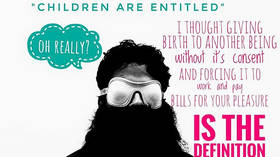Indian man wants to sue parents for birthing him without consent

A young Indian man has decided to sue his parents for giving birth to him without his consent. It may sound like satire, but “anti-natalist” Raphael Samuel is at the forefront of a social movement so new it barely has a name.
“I love my parents,” Samuel insists, “but they had me for their joy and their pleasure.” The Mumbai resident says his life has been “amazing” – he just doesn’t believe it should have been forced on him, and he certainly doesn’t want to inflict it on someone else.
“I don’t see why I should put another life through the rigmarole of school and finding a career, especially when they didn’t ask to exist,” he told Indian outlet the Print.
“Anti-natalism” – a conscious, morally-influenced choice not to reproduce – appears to be catching on in India, with multiple Facebook groups and real-life meetups springing up to serve this unusual outgrowth of the child-free movement. It has linked up with the decades-old Voluntary Human Extinction Movement, an environmentalist current that essentially posits the world would be a better place if humans quietly died out, and attracted “closeted” child-free Indian couples who say they’ve faced judgment, even persecution in their communities and families for choosing not to have offspring.
Posting as Nihilanand on Facebook, Samuel shares droll memes (“Isn’t forcing a child into this world and then forcing it to have a career kidnapping and slavery?”) featuring photos of himself sporting a billowing black beard.
While some child-free activists tout the environmental benefits of not reproducing, and a 2017 study proclaimed having one fewer child was one of the most effective ways to reduce one’s carbon footprint, environmental and population scientists point out that fertility rates are already declining – both in India and elsewhere in the world – and voiced skepticism that such a movement was necessary.
It’s tempting to blame Indian government policy for the rise of the anti-natalists: the world’s second-most-populous country has been encouraging small family sizes for generations, with door-to-door campaigns urging young couples to stop at two children and even doling out financial incentives to poor families who opt not to reproduce.
The anti-natalists – currently operating as “Stop Making Babies,” though the name is subject to change – plan to hold their first national conference on Sunday in Bengaluru. While the movement has reportedly been percolating among young Indians for some time, this is their first serious attempt to organize in real life. They say their goal is to establish a national-level organization to spread awareness about child-free living.
Think your friends would be interested? Share this story!













